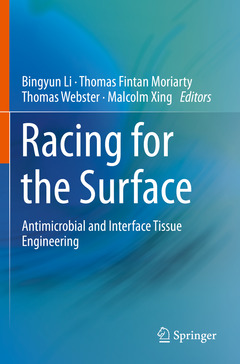Description
Racing for the Surface, 1st ed. 2020
Antimicrobial and Interface Tissue Engineering
Coordinators: Li Bingyun, Moriarty Thomas Fintan, Webster Thomas, Xing Malcolm
Language: English
Subjects for Racing for the Surface:
Publication date: 02-2021
Support: Print on demand
Publication date: 02-2020
809 p. · 15.5x23.5 cm · Hardback
Description
/li>Contents
/li>Biography
/li>Comment
/li>
This book covers the key basics of tissue engineering as well as the latest advances in the integration of both antimicrobial and osteoinductive properties. Topics covered include osteoconductive and osteoinductive biomaterials (calcium phosphate, bone morphogenetic protein, peptides, antibodies, bioactive glasses, nanomaterials, etc.) and scaffolds. Research integrating both antimicrobial/biofilm-inhibiting and osteoinductive/osteoconductive properties and their co-delivery is detailed and their roles in clinical success are discussed. Combined with its companion volume, Racing for the Surface: Antimicrobial and Interface Tissue Engineering, this book bridges the gap between infection and tissue engineering, and is an ideal book for academic researchers, clinicians, industrial engineers and scientists, governmental representatives in national laboratories, and advanced undergraduate students and post-doctoral fellows who are interested in tissue engineering and regeneration, infection, and biomaterials and devices.
Provides a basic-science introduction and theory related to osteoinductive studies and tissue engineering
Covers key topics in tissue engineering and advances in integration of both antimicrobial and osteoinductive properties
Illustrates how current technologies can be used to better understand and develop advanced biomaterials with both osteoinductive and antimicrobial properties that address delayed bone regeneration and infection simultaneously




